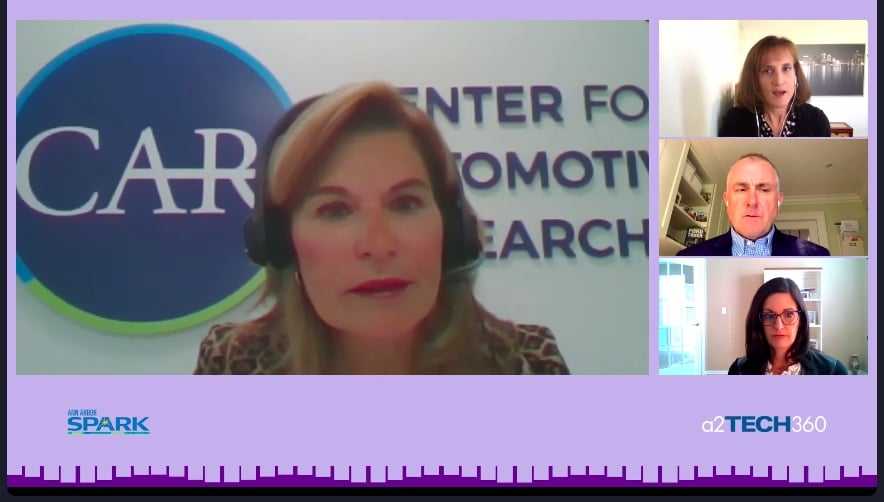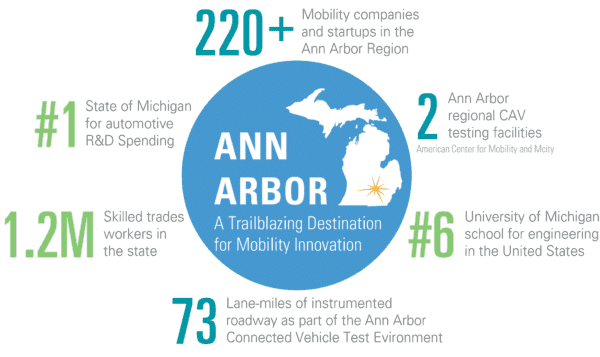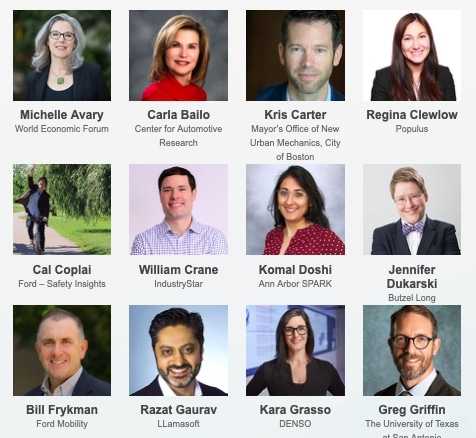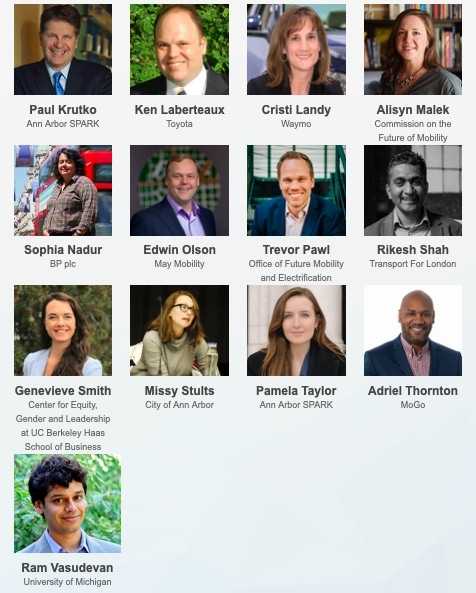engineering, mobility tech, tech events
The Ann Arbor Mobility Summit: Autonomous, Electrification, & Mobility as a Service Are Transforming The Future of Transport
By Laura Cowan
Laura K. Cowan is a tech, business, and wellness journalist and fantasy author whose work has focused on promoting sustainability initiatives and helping individuals find a sense of connection with the natural world.
Panel: Changing Face of Automotive in the New Normal
Carla Bailo, Center for Automotive Research (Moderator) • Bill Frykman, Ford Mobility • Kara Grasso, Denso • Cristi Landy, Waymo
Kicking off this year's expanded Ann Arbor Mobility Summit was a panel discussing the "Changing Face of Automotive in the New Normal" with Senior Product and Strategic Planning Manager at Waymo Cristi Landy, Bill Frykman who works on connected vehicles at Ford and leads the City Solutions Team, and Kara Grasso who works on solutions for mobility, autonomy and electrification for Denso. Moderating was Carla Bailo, president of the Center for Automotive Research, which provides independent research on the automotive industry.
Bailo started the discussion on shifts in integrating transport into city infrastructure by raising the changes in the layout of downtown Ann Arbor, which recently opened new bike lanes, reduced vehicle traffic lanes, and opened street dining for restaurants during the coronavirus shutdown.
"This is a time to reset and transition to the way the world is transitioning," said Kara Grasso. Bill Frykman said that Ford started tracking how many streets had been closed for coronavirus shutdown, for bike traffic, and then for restaurant dining with social distancing. "In the U.S. we saw 580 miles of city streets closed, that's 8,000 or more blocks, and that's changed how mobility can occur. As we emerge from coronavirus--we look forward to that time happening though we have a long road ahead--we might see more people working from home. It's an exciting time, to think how we might help all members of our societies move around and accomplish their daily tasks."
"We're definitely focused on people moving around safely. One of the advantages to self-driving cars is that you don't have to be exposed to the driver of the car [due to the coronavirus]," said Cristi Landy of Waymo. Control over cleanliness of vehicles is key. "We're in this transition--it's not the new normal, I think things are going to rebound a bit back--but it is making people keenly aware of their transportation choices and how often they need to move around versus doing things remotely."
"In the U.S. we saw 580 miles of city streets closed, that's 8,000 or more blocks, and that's changed how mobility can occur."
Bill Frykman emphasized that the road to autonomous vehicles was a long journey, and referenced the autonomous corridor recently announced to be opened between Ann Arbor and Detroit, connecting important city centers. Panelists agreed, and discussed work to make sure that public transport in particular continue to work toward equity in access to transportation.
"What has surprised you, what consumer behaviors have you seen?" Bailo asked Cristi Landy at Waymo, who paused services during COVID. "There's no human in the car, so people are very alert, looking at our screens. Then they moved into a more relaxed earned trust and start looking at their phones. There is a honeymoon new experience with driverless, and then they trust us and it becomes just another transportation option," Landy said. She added that Waymo has added hand sanitizer, wipes, and communicated with consumers how they sanitize vehicles. With regards to affordability, Waymo expects to make self-driving mobility services available to a wide variety of people and for the cost to come down over time.
Frykman said that his team at Ford work on electrifying their highest volume vehicles to meet the goals of the Paris Climate Accord, and are in constant discussions with cities to plan how they can "get the infrastructure in place to support those electric vehicles in their fleets."
"Each OE has a strategy to reach electrification," says Karla Grasso, but also companies are working on urban air pollution and looking out toward the longterm future to make urban life with new mobility more sustainable.
Behind The Scenes with Carla Bailo, President of The Center for Automotive Research
President and CEO of the Center for Automotive Research, Carla Bailo, who has a background in automotive engineering, sat down with us before the Mobility Summit to discuss trends she's seeing in the mobility space and the topics to be discussed at the summit.
"The biggest changes in mobility this year include the design of vehicles, the buying experience, and the customer experience after purchase," said Bailo. "Everything is fundamentally changing in our whole lives." But it's the human component that Bailo said is key to trends shifting because of COVID and other global shifts in transportation and how people live and move around. "We often talk about tech but it's people we're dealing with at the end of the day," she said.
For example, Bailo said, consumers are more sophisticated these days. Technology integrated into vehicle consoles has to hit a much higher standard than in previous years. "There's a lot of effort going into consoles, interfaces, and the voice recognition really has to work," she said.
There is also a large effort underway to improve technologies to protect drivers from distractions through technology, and "the whole way we develop a product has changed," Bailo said, "all the way through buying digitally. Interacting with the dealer has to be a simple, nice experience." She also gave examples of major changes in the car ownership experience after purchase that use technology to simplify maintenance, such as dealerships scheduling maintenance for customers. "There has been a digital transformation through the entire ownership process," she said.
"The whole way we develop a product has changed, all the way through buying digitally."
Other talks at the Mobility Summit included creating resilient supply chains using AI with Razat Gaurav, CEO of LLamasoft and William Crane, CEO of IndustryStar, public and private partnerships for improving mobility with Kris Carter, Mayor’s Office of New Urban Mechanics, City of Boston and Rikesh Shah, Transport for London. Trevor Pawl, Chief Mobility Officer at State of Michigan, and Alisyn Malek, Commission on the Future of Mobility, discussed government collaboration to advance mobility and electrification. Ken Laberteaux of Toyota, Sophia Nadur of BP plc, and Missy Stults from the City of Ann Arbor, discussed planning a sustainable ecosystem for future mobility. Edwin Olson, CEO of May Mobility, and Jennifer Dukarski, Butzel Long, discussed what's going on in autonomous vehicle development. Finally, Michelle Avary, World Economic Forum, Regina Clewlow, Populus, Cal Coplai, Ford, Greg Griffin, UT San Antonio, Genevieve Smith, UC Berkeley, and Ram Vasudevan, University of Michigan, talked about the challenge of handling bias in data. Many of these discussions are still emerging in the mobility space, as companies work to plan a mobility future that is integrated, accessible and equitable, and sustainable--no small challenge or short timeline.
Behind The Scenes With Trevor Pawl, Office of Future Mobility and Electrification
We caught up with speaker Trevor Pawl behind the scenes to ask about the trends he's seeing lately in mobility. Pawl works with the State of Michigan to advance planning for future mobility, including electrification, autonomous vehicles, and the changing integration of automotive with other forms of mobility technology. He has a high viewpoint from working with the State of Michigan to ensure futureproofing of the dominance of the state in the mobility sector and planning a more sustainable future with public and private partners. Through working between government and private sector partnerships, he has identified a number of trends that really summed up what a number of speeches at the Mobility Summit discussed:
"Platforms that have the ability to do dynamic routing, streamline payments and unify data will become increasingly important."
"We are really tracking three major trends--all of which are linked and have reinforcing effects," Pawl told us.
- Autonomous Futures — Autonomous technology will grow to a $3 trillion-plus industry by 2030; but vehicles will represent only a portion of that market. Autonomous technology is foundational across modalities (air, land, sea and space) and will transform all aspects of how we move people and goods in the near future, from personal transportation to public transit to freight.
- Vehicle Electrification Ramp Up — This is a platform shift that will transform the automotive supply chain. We are trying to keep up and leapfrog. Create favorable regulatory environments. As [well as] join and start interstate partnerships that allow someone to drive from Detroit to Minneapolis with consistent charging locations and experiences. The Mountain West States have it, the east coast states are starting to have it. The Midwest has to keep up. We also want to leapfrog, look at innovations that allow vehicles to charge while in motion and have the ability through their motion to add power back into the grid.
- Mobility as a Service — Platforms that have the ability to do dynamic routing, streamline payments and unify data will become increasingly important. Adoption of MaaS solutions has been slow to date, but now that platform players like Uber getting into the space, we will likely see a shift in consumer behavior.
"We believe that a systems-level approach will create economic development advantages and more equity in our state," Pawl said. "Focusing on all of three of these trends and leveraging them to build better systems in Michigan is what matters."
"How people and goods move is not isolated to one mode," he added. "Simply being the best at autonomous cars is too narrow of a win to claim global leadership over all of mobility. Core elements of the new mobility era (autonomous, connected, shared and electric vehicle technologies) are systematically linked. A state that intentionally and consistently integrates all these elements into its systems of movement for people and goods will have more economic development wins."
"Simply being the best at autonomous cars is too narrow of a win."
The conversation has shifted from individual technologies and their integration into a mobility landscape that expands beyond Michigan's traditional automotive industry, to a question of how COVID and other global events are reshaping where and how people live their lives and do their work--and how transportation technologies can serve those needs. Gone are the days of automakers refusing to electrify vehicles or holding on to older technologies and traditional supply chains. Now the race is on to develop a superior integration of multiple transport technologies with community infrastructure, and to use continuous iteration to improve the software behind the already superior hardware going into transport vehicles today.
a2tech360, ann arbor mobility summit, autonomous, carla bailo, center for automotive research m • bill frykman, denso • cristi landy, electrification, ford mobility • kara grasso, mobility as a service, waymo





